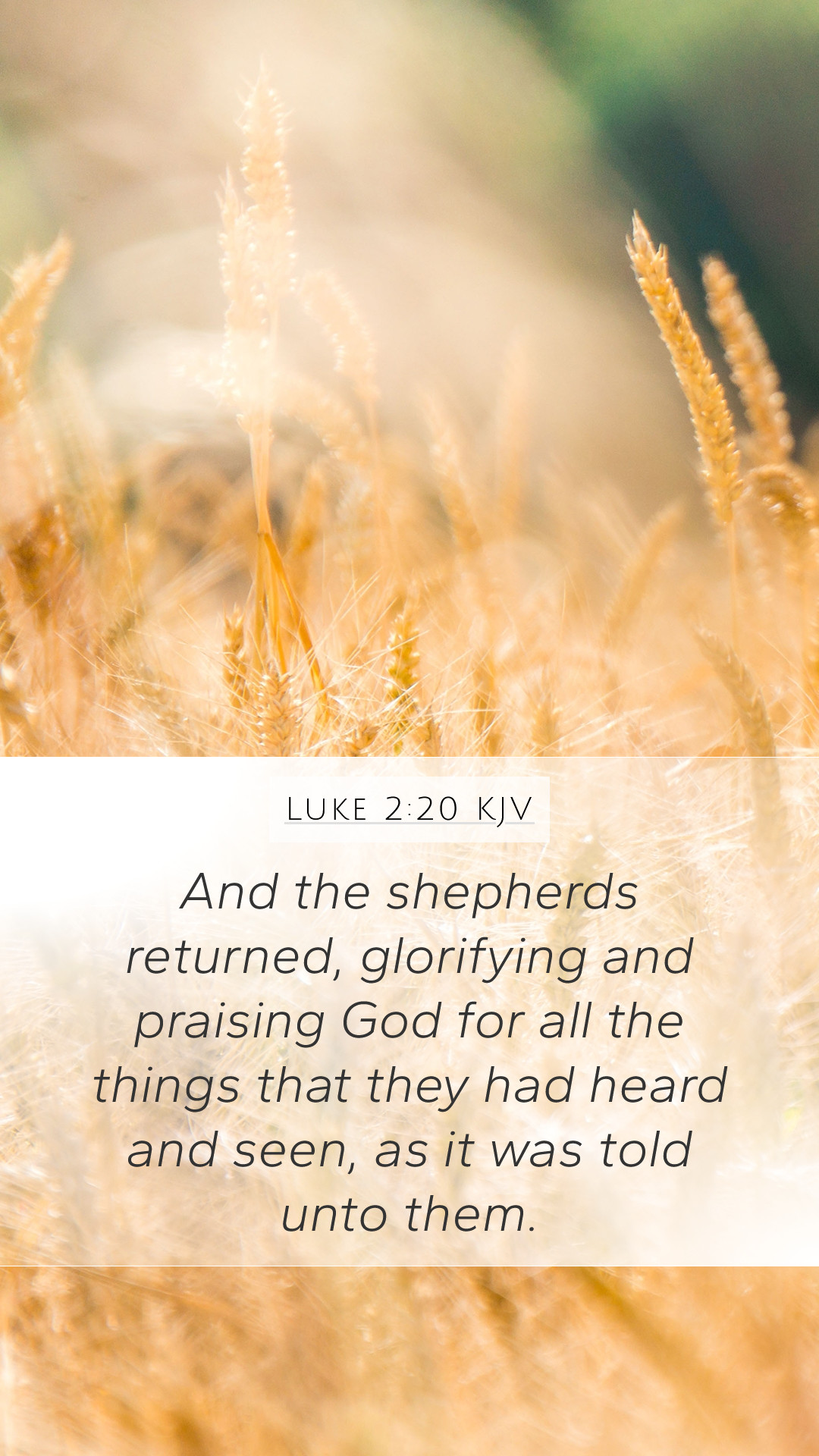Bible Verse Meaning: Luke 2:20
Verse: Luke 2:20 - "And the shepherds returned, glorifying and praising God for all the things that they had heard and seen, as it was told unto them."
This verse follows the profound account of the birth of Jesus Christ, emphasizing the response of the shepherds who witnessed the angelic announcement. Their return, marked by glorifying and praising God, is an essential element in understanding their experience and the larger narrative of the Incarnation.
Bible Verse Interpretations
Public Domain Commentaries:
- Matthew Henry: Henry highlights the deep significance of the shepherds' response, underscoring how their encounter with the angel led to a fulfilled promise. Their glorification signifies recognition of God's glory and the grateful acknowledgment of the miraculous event they witnessed.
- Albert Barnes: Barnes explains that the shepherds' actions reflect a natural outcome of faith. Having received the news of Christ’s birth, they were compelled to respond with worship, articulating a key principle in biblical faith—true encounters with God lead to praise and acknowledgment of His greatness.
- Adam Clarke: Clarke focuses on the emotional and spiritual state of the shepherds. He illustrates how their humble beginnings did not hinder their exaltation of the Lord. Their praises serve as an example of how all, regardless of status, are called to recognize and honor God’s works.
Understanding Scripture
In this passage, the shepherds symbolize the marginalized yet faithful recipients of divine revelation. Their encounter shows that God's message of salvation extends beyond the elite to the humble, emphasizing inclusivity in divine grace.
Key Insights from the Context
- Response to Revelation: The shepherds showcase a model for believers; upon receiving the good news, they responded with joyful exultation.
- Obedience and Witnessing: Their return to the fields, glorifying God, indicates a duty to share the message they received, an act that embodies the call to evangelism in the Christian faith.
Bible Study Insights
This verse is a rich source of theological reflection, providing implications for worship and community sharing in a modern context. It invites believers to consider how they express gratitude and share experiences of God's revelation in their lives.
Scripture Analysis
The phrase "as it was told unto them" emphasizes the reliability of God’s word. This encourages confidence in biblical promises as believers engage in their spiritual journeys, making this an excellent topic for Bible study groups.
Application of Bible Verses to Daily Life
Luke 2:20 inspires individuals to acknowledge and celebrate the works of God in their lives. Reflecting on this can foster a habit of gratitude and public testimonies of faith, reinforcing community ties and encouraging collective worship.
Historical Context of Bible Verses
The shepherds, often viewed as lowly figures in society, were the first to receive the news of Jesus' birth, symbolizing that the humility of Christ’s coming is for everyone. This sets a precedent for understanding who Jesus came to save and how God's kingdom operates.
Conclusion
Ultimately, Luke 2:20 is an invitation to reflect on our responses to God's revelations. Believers are encouraged to glorify God and share the joy of His works, embodying the spirit of the shepherds as they returned to their fields.
Related Cross References
- Luke 1:14 - The joy that comes from the announcement of John the Baptist's birth.
- Luke 2:8-12 - The announcement of Christ's birth to the shepherds by angels.
- Matthew 2:10-11 - The joy of the Magi when they found Jesus.


